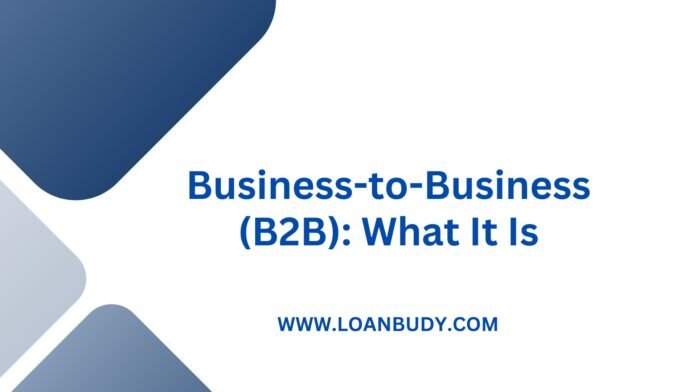What Is Business-to-Business (B2B)?
Business-to-business (B2B), also called B-to-B, is a form of transaction between businesses such as a manufacturer and wholesaler or a wholesaler and a retailer. Business-to-business refers to commerce that’s conducted between companies rather than companies and individual consumers.
Business-to-business stands in contrast to business-to-consumer (B2C) and business-to-government (B2G) transactions.
Key Takeaways
- Business-to-business (B2B) is a transaction or business conducted between one business and another, such as a wholesaler and retailer.
- B2B transactions tend to happen in the supply chain where one company will purchase raw materials from another to be used in the manufacturing process.
- B2B transactions are also commonplace for auto industry companies, as well as property management, housekeeping, and industrial cleanup companies.
- Meanwhile, business-to-consumer transactions (B2C) are those made between a company and individual consumers.
Understanding Business-to-Business (B2B)
Business-to-business transactions are common in a typical supply chain because companies must typically purchase components and raw materials for use in their manufacturing processes. Finished products can then be sold to individuals via business-to-consumer transactions.
In the context of communication, business-to-business refers to methods by which employees from different companies can connect through outlets such as social media. This type of communication between the employees of two or more companies is called B2B communication.
B2B E-Commerce
Grand View Research has reported that the B2B e-commerce market was estimated at $18,665.5 billion in 2023 and that it’s expected to grow at a rate of about 18.2% annually from 2024 through 2030. It attributes the growth to rapid technology improvements.
Company websites allow interested parties to learn about a business’s products and services and to initiate contact. Online product and supply exchange websites allow businesses to search for products and services and initiate procurement through e-procurement interfaces. Specialized online directories provide information about particular industries and companies and the products and services they provide. This also facilitates B2B transactions.
Special Considerations
Successful business-to-business transactions require planning. They rely on a company’s account management personnel to establish business-client relationships. Business-to-business relationships must also be nurtured for successful transactions to take place, typically through professional interactions before sales.
Traditional marketing practices also help businesses connect with business clients. Trade publications aid in this effort, offering opportunities to advertise in print and online. A business’s presence at conferences and trade shows also builds awareness of its products and the services it provides to other businesses.
Examples of Business-to-Business (B2B) Commerce
Business-to-business transactions and large corporate accounts are commonplace for firms in manufacturing. Samsung is one of Apple’s largest suppliers in the production of the iPhone. Apple also holds B2B relationships with firms like Intel, Panasonic, and semiconductor producer Micron Technology as of fiscal year 2022.2
B2B transactions are also the backbone of the automobile industry. Many vehicle components are manufactured independently and auto manufacturers purchase these parts to assemble automobiles. Tires, batteries, electronics, hoses, and door locks are typically manufactured by various companies and sold directly to automobile manufacturers.
Service providers also engage in B2B transactions. Companies specializing in property management, housekeeping, and industrial cleanup often sell these services exclusively to other businesses rather than to individual consumers.
What Is the E-commerce Market?
E-commerce includes all transactions that are accomplished from start to finish on the Internet. Products and services are purchased online and payments for products and services are also transmitted electronically. But this doesn’t mean that a company can’t also engage in brick-and-mortar transactions with customers or clients.3
What Are Some Common B2B Purchases?
A retailer who purchases merchandise from manufacturers for resale to consumers has engaged in a B2B purchase but the purchases don’t necessarily have to be resold. They can include software that’s used for business purposes or shared business or office spaces.4
What Is a Business-to-Government (B2G) Transaction?
A B2G transaction involves selling information, services, or products to a government. These are generally E-commerce exchanges but they’re not limited to online activity. They’re typically entered into under contract. A business submits bids and the government selects one of those bids and takes it to contract.5
The Bottom Line
B2B transactions usually occur between wholesalers and retailers. A wholesaler will sell products to a retailer and that retailer then places price tags on them and offers them to consumers for a profit. They can also involve a manufacturer purchasing necessary raw materials from a supplier to create a product that can eventually be sold to consumers. In any case, the cost generally trickles down to consumers.
Read More:
- Jalen Brunson Joins Forces with the New York Knicks: What This Means for the League
- Guaranteed Investment Fund: Definition, How It Works, Types 2024












